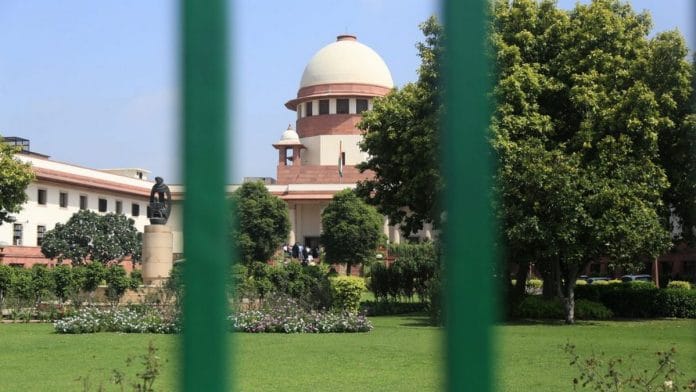New Delhi: Affirming one’s right to choose a life partner, the Supreme Court Monday held a public solemnization or declaration of “self-respect” marriages in Tamil Nadu is not needed in terms of a state amendment of the Hindu Marriage Act, 1955, which allows a couple to tie a knot in the absence of a priest, through a written or an oral declaration.
A bench headed by Justice S.R. Bhat made this observation while setting aside a May 2023 Madras High Court judgement, which declared a self-marriage ceremony cannot be performed in secrecy and that an advocate cannot attend such a marriage.
The court observed that couples intending to marry may refrain from making a public declaration due to various reasons, including familial opposition, or fear for their safety. In such cases, enforcing a public declaration could put lives at risk and potentially result in forced separation, the bench said.
On the point of an advocate’s participation, the top court said that lawyers can attend a “self-marriage” ceremony and be witnesses as friends/relatives/social activist etc, but not in professional capacity (as an officer of the court).
A self-marriage practise was recognized by Section 7A Hindu Marriage Act, 1955 (Tamil Nadu State Amendment). This allows a couple to solemnize their marriage through a joint declaration to live as husband and wife in the presence of relatives, friends or other persons. In this type of marriage, a Hindu couple is not needed to follow any religious practices and can be declared married to each other in the presence of relatives, friends or other persons.
This section creates a special provision regarding “suyammariyathai and seerthiruththa marriages” and is applied to any marriage between two Hindus.
The couple can either declare in any language understood by the parties that each takes the other to be his wife, or as the case may be, her husband or garland each other, or put a ring upon any finger of the other, or by the tying of the thali. Though registration of such a marriage is compulsory in Tamil Nadu, non-registration does not render it invalid.
The validity of section 7 was upheld by the Supreme Court in a 2001 judgement.
In the case at hand, a man had approached the top court against the Madras High Court’s 5 May verdict, which held that marriages performed by the advocates are not valid and that self-respect marriage cannot be solemnised in secrecy.
The HC order was delivered on his habeas corpus petition seeking a direction to the police to produce his 20-year-old wife.
A. Velan, the petitioner’s lawyer, told ThePrint that the two had done a “self-respect marriage,” after the woman eloped, leaving her maternal uncle to whom she was married off forcibly.
“Her marriage to the uncle was when she was a minor, which is less than 18. Though under the Hindu Marriage Act such a relationship would fall under the prohibited category, in Tamil Nadu it is permitted as per the local customary law,” Velan explained.
The woman was taken away by her maternal uncle and his henchmen, following which the petitioner filed the petition. The HC, however, dismissed his petition on two grounds — that self-respect marriages cannot be solemnised in secrecy and that advocates cannot perform these marriages.
The HC based its decision on a 2014 division bench judgement of the same court. It further directed the Bar Council to initiate disciplinary action against the advocates for issuing a “fake marriage certificate”, after the public prosecutor’s assertion that the lawyers had issued the certificate.
Velan, however, told ThePrint, while quoting from the petition, the HC had dismissed the habeas corpus petition on admission stage without seeking a response from the other side or going into the records.
The top court was informed it was an erroneous finding by the HC, which mistook the joint declaration by the couple to be the advocates’ certificate.
Also Read: Child custody to inheritance, how personal laws shape family dynamics in India
What top court said
While considering SC’s 2001 judgement as well as the provisions of the law, Justice Bhat’s bench declared that the restriction on advocates is unreasonable.
The court disagreed with HC’s view and said that the 2014 Madras HC judgement on which the May 2023 verdict relied was based on an assumption that every marriage requires a public solemnisation or declaration.
“The views expressed by the Madras High Court in Balakrishnan Pandiyan (2014 judgement) are erroneous. It is premised on the assumption that each marriage requires a public solemnisation or declaration. Such a view is rather simplistic because often due to parental pressure, couples intending to enter into matrimony may not enter into it for the reason of such opposition, hold or give such public declaration, as doing so would imperil their lives and could very likely result to threat of bodily integrity, or forcible or coerced separation,” the bench observed.
It is not hard to visualise other pressures brought to two individuals who are otherwise adults and possess free will, the top court said.
The two HC judgements not only narrow an “otherwise wide import of the statute (section 7A of HMA practised in Tamil Nadu), but is also violative of the right under Article 21 of the Constitution”, the court opined.
With regard to an advocate’s presence in such a marriage, the court said advocates have many capacities. As a counsel, they should not undertake or volunteer to solemnize marriages, but in their private capacity or as friends they can attend such weddings as witnesses, it added.
(Edited by Tony Rai)
Also Read: Arya Samaj weddings don’t need registration under Special Marriage Act: SC stays MP HC order






